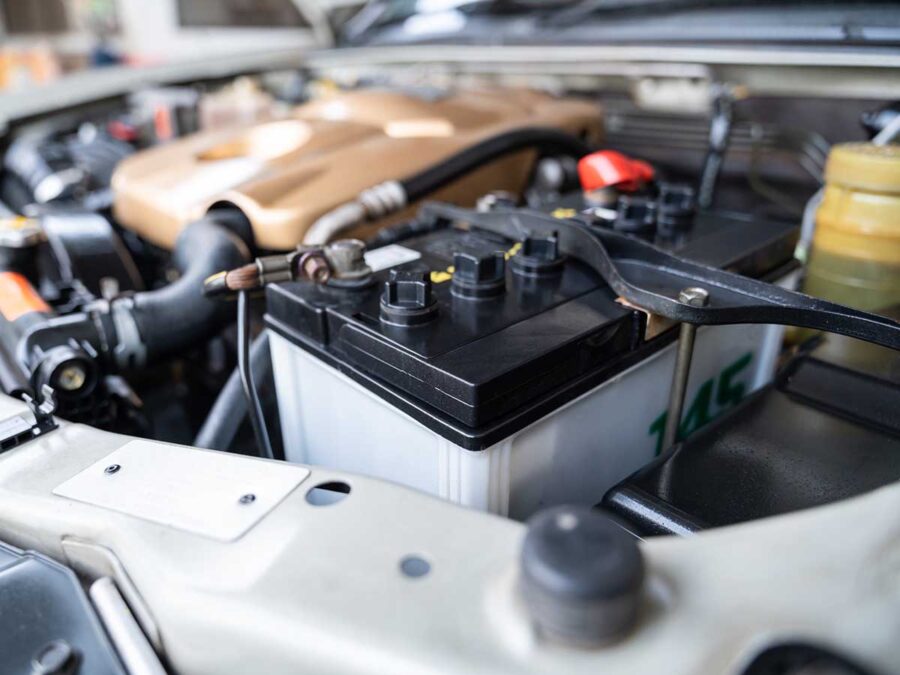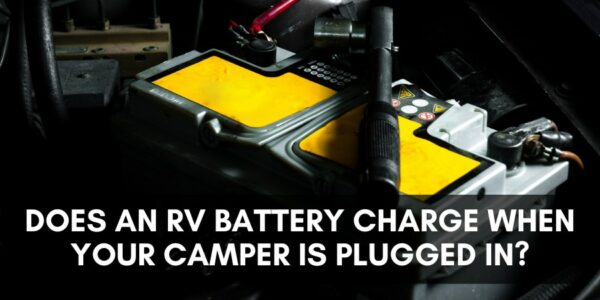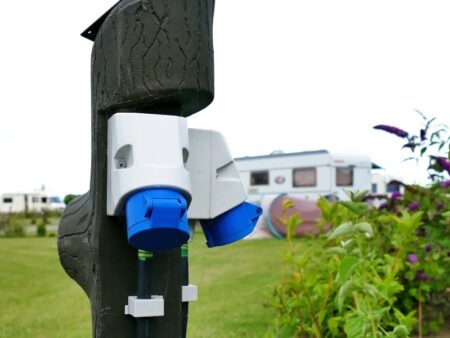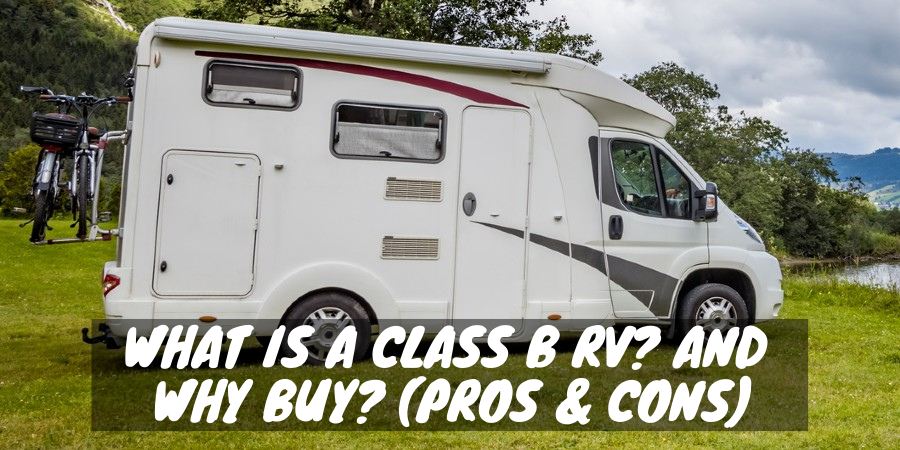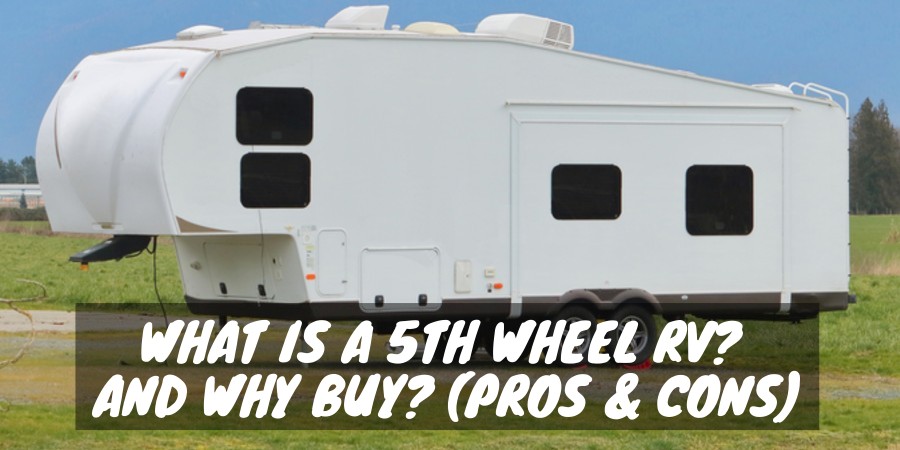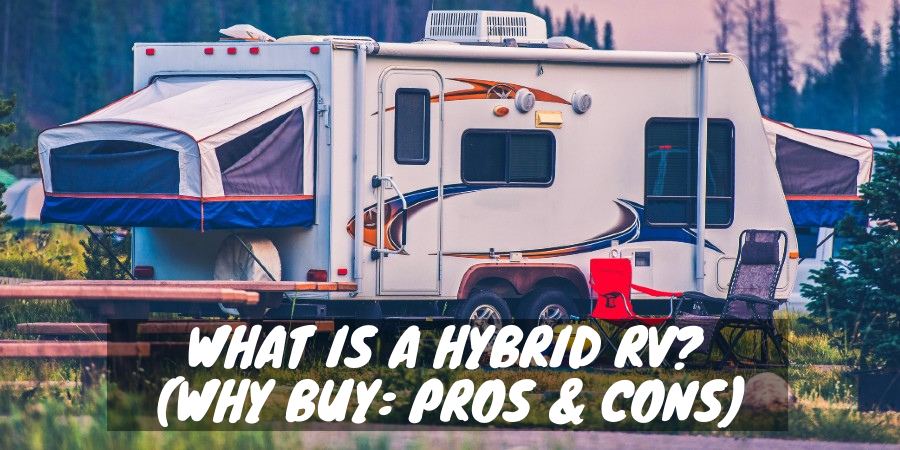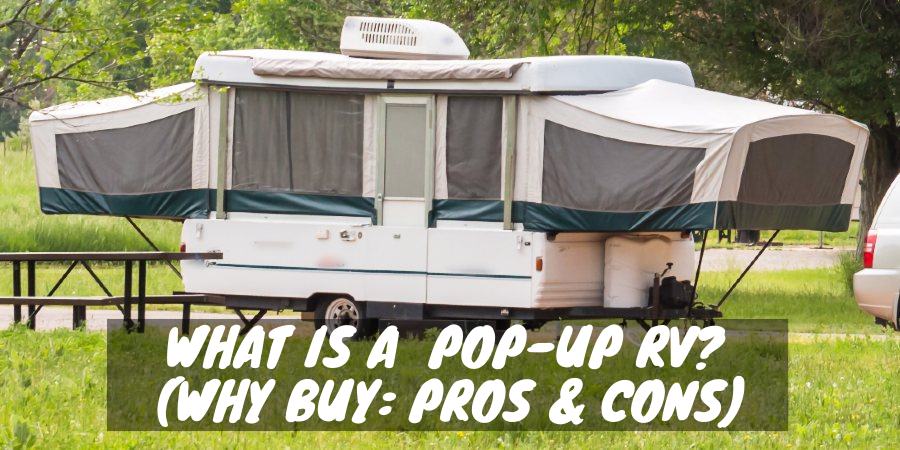If you’re thinking of switching out your standard RV house battery for a lithium battery, you probably have questions about how much they cost, whether they are safe, what size is best for your RV, and if they work, as well as deep-cycle batteries.
To help guide you through buying the best lithium batteries for RV installation, we gather all the essential facts and information and explain it right here.
An RV lithium battery upgrade may be a perfect fit for your camping style, so keep reading to find out!
Reasons to Consider A Lithium RV Battery
Switching from the typical AGM or lead-acid deep-cycle battery manufacturers install in recreational vehicles to a lithium battery can provide these benefits:
- Faster charge
- Produces twice the power
- Weighs about 50% less
- Lasts four times longer
- Works at lower temperatures (-20°F)
- Delivers safe and reliable power
Being able to run your 12-volt RV appliances and devices will be more convenient with a lithium battery because they are far superior in terms of power delivery and speed of recharge.
If you’re looking for a battery that can support solar panels, you can choose a lithium iron phosphate battery (LiFePO4). A LiFePO4 battery is even better than a straight lithium-ion battery because it cannot overheat and possibly cause a fire or other damage to your RV.
The way a lithium-ion phosphate battery functions is also different from a lead-acid battery because it has a flat voltage curve. This flat voltage means it doesn’t drop as the battery is being used, so you can use nearly all the energy stored inside before needing to recharge, unlike a lead-acid battery that needs a recharge after around 50% of the voltage used.
Upgrading to a lithium house battery in your camper is an even better investment if you love to boondock or camp off-grid because it allows you to have more power for a longer time, enabling you to use your 12-volt RV appliances much longer. With a proper lipo inverter, lithium batteries can even power 120-volt appliances.
How to Convert to Lithium Batteries (Video)
A lighter battery is excellent for smaller travel trailers where overall weight is a concern, allowing you to add solar or extend lighting and appliance use when not using shore power. Halving the weight also gives you the ability to add a second house battery to increase your RV’s power storage capacity.
Lithium batteries require little maintenance and are even more worry-free if you install a management system to ensure optimal charging and use of the power over its lifetime. On the other hand, lead acid batteries require routine checks to ensure water covers the cells, that you aren’t discharging it too far, and that temperature extremes aren’t causing physical damage to the housing or terminals.
Lastly, the discharge rate of an idol lithium-ion battery is only 1-2% a month, which means you’ll not have to worry about returning to a dead battery if you place your RV in storage for several months. In addition, the lifespan of a lithium battery is much longer than lead-acid varieties, so you only have to replace them about every ten years.
How Much Do Lithium RV Batteries Cost?
The average cost of a deep-cycle lead-acid RV battery is $125, whereas a lithium RV battery can start at around $400 and go up to well over $2,000.
The initial cost of a lithium battery can seem like a daunting hurdle to jump, especially if you’re already on a tight budget. However, because of the price, it’s beneficial to look at your camping style to determine if you even need one.
For example, if you only travel in your RV short distances and stay at full-hookup campgrounds, you’ll be running all your lights and appliances on shore power. In this scenario, keeping expenses lower by using a lead-acid battery is perfectly fine.
If you have solar panels and spend lots of time camping off-grid, a powerful and long-lasting lithium battery will be well worth the investment. The same is said for full-time RVers who may spend time on and off-grid and don’t want the hassle of constantly changing out lead-acid batteries every few years.
In the RV world, paying a bit more for a quality LiFePO4 battery is the way to go. The battery will not overheat, and the contents are non-toxic, which means they are better for the environment when it’s time to dispose of them.
How to Choose The Best RV Lithium Battery Size
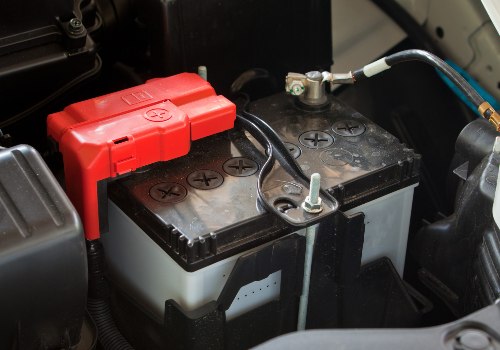
Choosing the correct size lithium battery for your recreational vehicle is important to keep the “lights on” when you need them most.
The most basic choice is a 100Ah lithium battery that will power a smaller RV (around 22 feet or under). This battery size should run the lights, water pump, fans, electronics, an electric cooler, radio, and any ignition or control panel for the propane furnace, water heater, or refrigerator.
If you have a tiny camping trailer, such as a teardrop, you can opt for a 6v lithium-ion battery with about 54 watt-hours of power to run a light or low-power device. Be aware that running 12-volt lights off a 6-volt battery will result in dimmer illumination, but it will undoubtedly be enough to navigate inside your camper in the dark.
Next are other options for what size lithium battery bank you’ll need to operate your RV without connecting to standard electrical power.
20′-30′ Motorhome, travel trailer, or fifth wheel will need:
2 x 100Ah or 1 x 170Ah – Lights, stove, radio, fans, TV, small electric refrigerator or medium electric cooler, electronics, water pump, and any ignition or control panel for a propane furnace, water heater, or refrigerator.
30′-40′ Motorhome, travel trailer, or fifth wheel will need:
2-4 x 100Ah or 2 x 170Ah – Lights, stove, radio, fans, medium electric fridge or large electric cooler, large TV, water pump, electronics, and any ignition or control panel for a propane furnace, water heater, or refrigerator. Four 100Ah batteries should provide enough power to run an air conditioner for short intervals if you have an inverter as part of your RV 12-volt electrical system.
40’+ Motorhome, travel trailer, or fifth wheel will need:
6-8 x 100 Ah or 2-5 x 170 Ah (with inverter)- Lights, stove, oven, radio, fans, residential-size fridge, large-screen TV, entertainment systems, water pump, electronics, air conditioner, and any ignition or control panel for a propane furnace or water heater.
Lithium Battery Power for RV Solar Panels
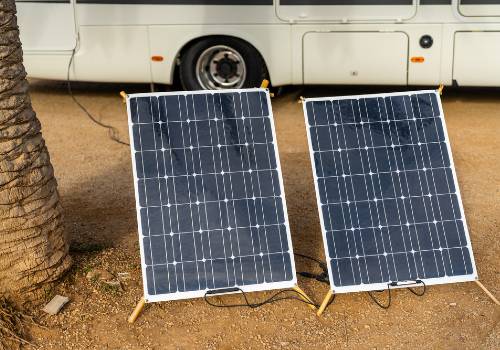
If you want to know what size lithium battery is necessary to complete a solar power system for your camper, here are basic recommendations:
- 14′ and under: 1-2 100Ah for 100-115 watt panel
- 15′-20′: 1-2 100Ah for 150-170 watt panels
- 21′-30′: 2 100Ah for 300 watt panels
- 31′-40′: 3-4 100Ah for 500-600 watt panels
- 40’+: 1-2 100Ah for 700-1100 watt panels
For the best results using lithium batteries in any recreational vehicle, you must ensure you have a compatible charger and battery tender made for use with lithium batteries and a quality inverter to move the stored power to your RV appliances and devices.
Another thing to note is that newer RVs with solar kits often have a setting on the solar charge controller for lithium that will make the switch from lead-acid batteries easier.
9 Best RV Lithium Battery Brands
These lithium battery brands have been tried and tested in the RV community for many years and offer the most reliable performance and ratings:
1. Battle Born Lithium 100Ah
Want to Connect With a Community of Over 1,078 RV Enthusiasts?
Battle Born gets consistently high marks from RVers for delivering maximum power and life expectancy. The company also sells them in 24-volt sizes for large rigs like Class A motor coaches.
Battle Born Lithium 100AH (Video)
2. Dakota Lithium 12V 54Ah
The Dakota Lithium battery only uses the highest quality battery management system and lithium battery cells and offers an industry-leading 11-year warranty. Perfect size for small to medium RVs that require general power for small appliances and lights. Another notable feature is that it provides a fast charge that will recharge the battery using your solar panels in only 90 minutes.
Dakota Lithium 12V 54Ah (Video)
3. Expion360 VPR 4EVER (LiFePO4)
The Expion360 VPR 4EVER LiFePO4 120Ah utilizes the latest lithium technology, so the battery stores and delivers the strongest power and performance. RVers love how fast the battery recharges and that it will last through over 2,000 charging cycles before needing replacement.
Expion360 VPR 4EVER (LiFePO4) (Video)
4. RELiON 12V 20Ah LiFePO4
The RELiON 12V 20Ah LiFePO4 lithium battery is the perfect size choice when adding solar to your RV, as it can store enough power (10x a comparable lead-acid battery) to keep lights and small devices running. Weighing in at only 5.6 pounds, the RELiON won’t cause issues keeping your camper’s GVWR under its limits.
Relion Charging (Video)
4. AIMS LiFePO4 12V 100Ah
The AIMS LiFePO4 is the best lithium battery choice if you camp in hot climates, with no reduction in performance at even extreme temperatures. While this battery does weigh 27.5 pounds, it offers a built-in management system and can go through an incredible 4,000 discharge cycles before losing the capacity to operate.
5. Canbat CLI100-12LT 12V 100Ah
If you love to camp in cold weather or downright wintery conditions, then the Canbat CLI100-12LT must be on your shopping list. This lithium battery offers LiFePO4 technology and allows charging at temperatures as low as -4°F (-20°C). The battery also features M8 terminals, a BMS that will disconnect from the cells to protect battery life, and uses internal power to maintain temperatures for optimal charging functions. In addition, you can daisy-chain up to four Canbat lithium batteries together to harness enough power for your RV needs.
6. ExpertPower RV 100Ah Lithium Deep Cycle 12V Battery
The ExpertPower RV 100Ah is excellent on its own, or add another to keep any size RV going strong when not plugged into shore power. It can remain above 12 volts for up to 90 percent of the capacity for reliable power to run appliances and lights. The 22-pound weight makes it easy to maneuver inside your RV battery compartment, and the manufacturer states it can run through up to 7,000 discharge cycles. So, even with heavy use, it’s guaranteed to last a minimum of 2,500 cycles.
ExpertPower RV 100Ah Lithium Deep Cycle 12V (Video)
7. Ampere Time Lithium 200Ah Deep Cycle Battery
The Ampere Time Lithium 200Ah Battery with LiFePO4 technology is a workhorse that will reduce hassles keeping your RV running when camping off-grid. You can safely mount the Ampere in any position, and with the M8 terminals, you can hook up to four batteries together for maximum power storage.
The discharge curve lets the battery remain above 12.8V for up to 95 percent of its capacity, and you can put it through 4,000-8,000 discharge cycles, which means years of carefree use. In addition, the battery has built-in vibration protection, a high-temperature cut-off at 167°F (75 °C), and a battery management system for ultimate safety.
8. Mighty Max 12V 100AH Lithium Battery
The Mighty Max Battery 12V 100Ah Lithium Battery is one of the more affordable batteries for RV installation yet still offers 2,500 discharge cycles, which means a longer lifespan. The size makes it perfect as a direct drop-in replacement for standard AGM or lead-acid RV batteries, but it only weighs 20 pounds, so it’s easy to carry and move. With a battery management system that protects against overheating, overcharges, and short circuits, you are still getting a quality lithium battery at a budget-friendly price.
Mighty Max 12V 100AH Lithium Battery (Video)
9. SHUNBIN 12V Lithium-ion Battery
SHUNBIN 12V Lithium-ion Battery comes in 100Ah, 200Ah, 300Ah, and 400Ah sizes so that you can pick the perfect model for your camping needs. The battery functions perfectly through temperature extremes and offers a BMS protection system, a fast recharge speed, and easy installation with built-in handles on the top of the unit. The only downside to this lithium battery for RV use is that it can only handle 2,000 discharge cycles, which is fewer than many other models.
RV Lithium Battery Wrap-Up
Understanding the benefits of switching to a lithium battery can help you decide if doing so is a good choice for your RV lifestyle. For some, it will be a no-brainer to go lithium, while others may find their standard lead-acid or AGM deep-cycle battery will do the job just fine.
The more you know about ways to increase your RV safety and performance, the more enjoyable camping trips will be. Please compare the costs and maintenance of lead-acid and lithium batteries in your RV over a decade and see which is the right option.
Upgrading to a lithium battery in your camper will extend the life of your 12-volt power, so if you’re considering investing in a lithium RV battery, please check out our recommendations on the size and find a suitable brand for your needs!
"Man cannot discover new oceans unless he has the courage to lose sight of the shore."
-- Andre Gide

